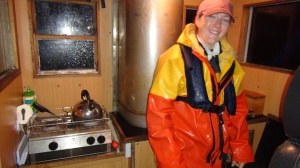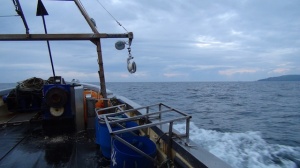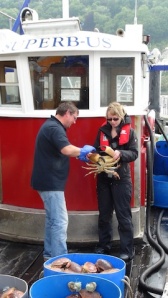A month ago, I spent the day with a couple of crab fishermen in Salcombe, Devon. And I don’t mean just down the pub.
I was on a boat; their crabbing boat. 14 hours. 3am start and no loo. That’s right – no loo. I was also seasick for 13.5 hours – this may in part have been induced by the no loo situation – who knows. But either way, the day had all the hallmarks of a brief trip to hell.
But surprisingly, it wasn’t…

Now first of all, let me address why I was there. Well, I work for a project called GAP2, which is all about getting fishermen and scientists to work together. Many of you may not have realized that fishermen-scientist relationships are “an issue”– but they are, and they need to improve if we’re to work out how to better manage our often-overfished waters.
Reaching across Europe, GAP2 is running a project in the UK, where scientists Emma Pearson & Dr Paul Hart (from the University of Leicester) are working closely with crabbers operating out of Salcombe & Dartmouth.
So I was in Devon to make a short film on everyone’s progress.
Thus a day on the boat it was.
The Bed & Breakfast owner thought I was mad and I wasn’t convinced she was wrong. Emma, the hardy scientist I was accompanying, was completely at ease with a prospect of a day onboard, as her work necessitates going out with the fishers often a few times a week. But I was less sure. A land lubber and a wimp, I was harbouring a dark suspicion that not only would breakfast make a swift reappearance, but that a 14 hour day full of fish and waterproofs wouldn’t be “that much fun”.
The night before was filled with trepidation. I spent quite some time wrapping my camera in clingfilm, I de-spidered the wellies, and I set the alarm clock with care. And I didn’t drink much fluid. All was set.
 At 3am, the alarm sounded and I positively leapt out of bed. After negotiating my way into three layers of clothing and becoming a packhorse to a tripod, camera and enough food for a 14th century expedition to France, Emma & I exchanged a sleepy good morning before climbing into the car. We were off. Driving through the darkness, the roads were quiet and we quickly (oh how quickly) arrived at the dock. There we met the skipper, Alan Steer, who had kindly agreed to take us onboard his boat “Superb-us”. Deck hand Paul was also on side and we made our way to the boat.
At 3am, the alarm sounded and I positively leapt out of bed. After negotiating my way into three layers of clothing and becoming a packhorse to a tripod, camera and enough food for a 14th century expedition to France, Emma & I exchanged a sleepy good morning before climbing into the car. We were off. Driving through the darkness, the roads were quiet and we quickly (oh how quickly) arrived at the dock. There we met the skipper, Alan Steer, who had kindly agreed to take us onboard his boat “Superb-us”. Deck hand Paul was also on side and we made our way to the boat.
 Arriving onboard, in the 4am gloom I was pleasantly surprised. There was an indoor bit – “the wheelhouse”, and there was even a hob and a kettle! As we chugged out of Dartmouth we all had a cup of tea. Alan put his feet up on the dashboard, we had a chat about crabs and I ate a banana. Perhaps all was going to be well?
Arriving onboard, in the 4am gloom I was pleasantly surprised. There was an indoor bit – “the wheelhouse”, and there was even a hob and a kettle! As we chugged out of Dartmouth we all had a cup of tea. Alan put his feet up on the dashboard, we had a chat about crabs and I ate a banana. Perhaps all was going to be well?
 It wasn’t. The banana made reappearance swiftly. The travel sickness tablets too. I hung over the back of the boat. Although a beautiful, tranquil day in early June, my worse suspicions had been confirmed. The grey water slopped around the gunwale and I hoped I hadn’t ruined any paintwork.
It wasn’t. The banana made reappearance swiftly. The travel sickness tablets too. I hung over the back of the boat. Although a beautiful, tranquil day in early June, my worse suspicions had been confirmed. The grey water slopped around the gunwale and I hoped I hadn’t ruined any paintwork.
But then the fishing started. As the morning sun rose in the sky, Paul and Alan made their way out onto deck. The first string of crab pots was going to be pulled. The fishermen were about to start reeling in their livelihood, and there was a buzz in the air.
 Paul stood by the bait table, sharpening his knife. While it was a calm day, it still seemed particularly hazardous to be so casually holding such a sharp blade while standing on a slippery, moving deck. But Paul showed no such qualms and started ripping open a box of haddock.
Paul stood by the bait table, sharpening his knife. While it was a calm day, it still seemed particularly hazardous to be so casually holding such a sharp blade while standing on a slippery, moving deck. But Paul showed no such qualms and started ripping open a box of haddock.
Meanwhile, Alan operated the winch. The winch was hauling a rope, attached to which were the boat’s “crab pots”, laid out in neat rows along the seabed. For the uninitiated, crab pots are traps for the sideways scuttlers. Each weighs between 30kg, is made of a rope-wire mesh, and emerges from the sea covered in brittlestars.
 As Alan pulled the pots from the surface of the water, he set them on his table by the side of the boat, opened the trap door and sorted the crabs inside. Underweight crabs, malting crabs and “berried females” (i.e. those carrying eggs) were returned to the water. The rest were sorted into males and females and plopped into blue bins underneath the sorting table.
As Alan pulled the pots from the surface of the water, he set them on his table by the side of the boat, opened the trap door and sorted the crabs inside. Underweight crabs, malting crabs and “berried females” (i.e. those carrying eggs) were returned to the water. The rest were sorted into males and females and plopped into blue bins underneath the sorting table.
 The emptied pots were then passed along the table to Paul who fitted fish and then returned the empty, re-baited traps to a growing, neatly stacked pile on the opposite side of the boat. Emma the scientist stood close by to record the catch.
The emptied pots were then passed along the table to Paul who fitted fish and then returned the empty, re-baited traps to a growing, neatly stacked pile on the opposite side of the boat. Emma the scientist stood close by to record the catch.
Activity settled into a steady, smooth flow of motion. The calm cries of “Cock, hen, soft cock, berried” merged with the chirpy background noise of Radio 1, and life began to look up for the pale and sweaty onlooker.
Having managed to focus on something other than the horizon, I got my camera out. The full film of the day is yet to be edited, but if you want a short glimpse of the activity, you can watch this on minute snapshot of the day here.
Next, once all the pots on the string had been hauled, we sailed back down the route that we’d come, relaying the string clean and empty to catch some crabs afresh.
And then we did it again. And then again. With 11 strings, this took all day. But there’s something about fishing that merely describing “how it works” can’t capture.
It’s a strange mix between factory efficiency and the great outdoors. And not just the outdoors experienced in a field – but the vast expanse of the ocean. Knife blades gleam, machinery whirrs and men in overalls move with smooth efficiency. But the seawater slops over the side of the boat. The rope from the winch swirls into vast snakey coils and the sun shines as a sea urchin rolls across the deck.
 There’s a feeling of purposeful busyness, tempered by freedom. Sure – the day was all about work, there was an alarm clock get-up, a production line and uniform – but there was also a vast horizon, ever changing colours of the sea and the odd over-friendly seagull.
There’s a feeling of purposeful busyness, tempered by freedom. Sure – the day was all about work, there was an alarm clock get-up, a production line and uniform – but there was also a vast horizon, ever changing colours of the sea and the odd over-friendly seagull.
This is not to romanticize the occupation of fishermen. Their industry commands the highest death toll in Europe, the hours are long, and you rarely meet a millionaire.
On the other hand, I can see why they do it.
At about 3pm, all the strings had been pulled and re-laid and we began our journey back home. I can’t deny that there was a large part of me that was relieved; mightily relieved. Particularly so that I could find a loo.
 Yet as we unloaded the catch in Dartmouth, and took a photo of me holding the biggest cock we could find, I felt like I’d achieved something. I’d made a connection with a food source, I’d witnessed an industry centuries old, and I’d tackled an environment I’m not best suited to. Obviously – I’d only taken some film – and everyone else on board remained of the opinion that I was a city softie. But while the day was characterized by nausea, and everything did pong somewhat of haddock – it transpires that fishers may have the right idea…
Yet as we unloaded the catch in Dartmouth, and took a photo of me holding the biggest cock we could find, I felt like I’d achieved something. I’d made a connection with a food source, I’d witnessed an industry centuries old, and I’d tackled an environment I’m not best suited to. Obviously – I’d only taken some film – and everyone else on board remained of the opinion that I was a city softie. But while the day was characterized by nausea, and everything did pong somewhat of haddock – it transpires that fishers may have the right idea…
Accordingly – I’m going to be blogging more about them in the coming months. Stay tuned for the film in full, an explanation of French nicking, and an interview with Alan the skipper!
